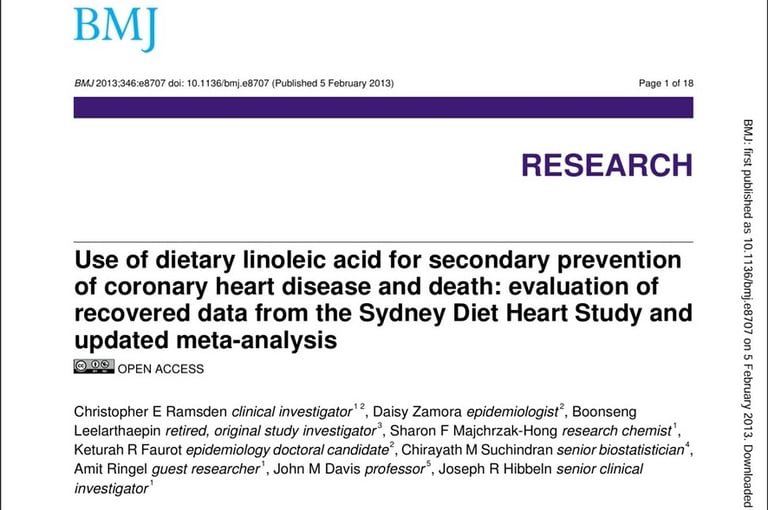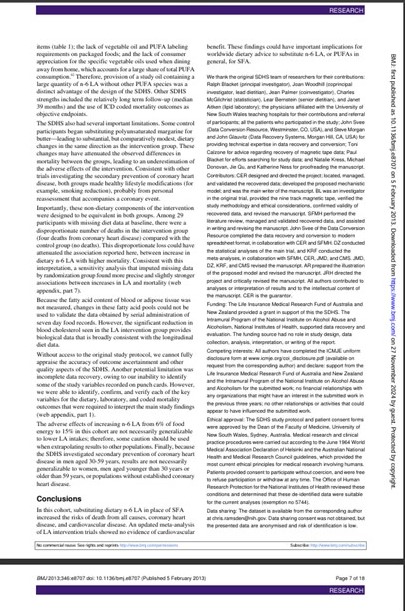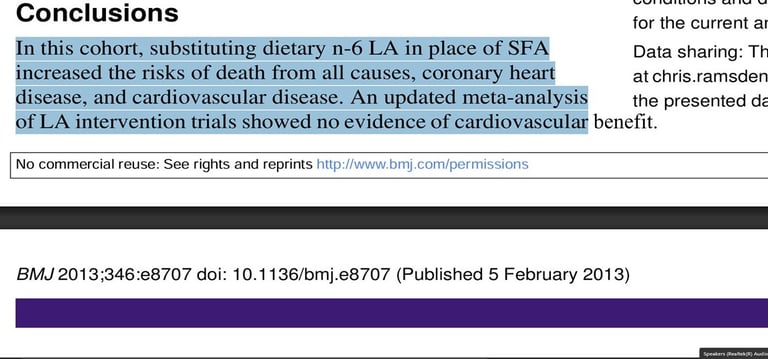"Uncover the truth behind the groundbreaking discovery of the causes of the world's biggest problems. 'The Root Causes' will change how you view the world!"
Evaluating the Impact of Omega-6 Linoleic Acid on Heart Health
This study evaluated the effectiveness of replacing dietary saturated fat with omega-6 linoleic acid (found in safflower oil) for the secondary prevention of coronary heart disease (CHD) and death. Data from the Sydney Diet Heart Study, a randomized controlled trial conducted between 1966 and 1973, was reanalyzed, and an updated meta-analysis was performed. The study involved 458 men aged 30-59 with a recent coronary event, where the intervention group replaced saturated fats with omega-6 linoleic acid. The primary outcome was all-cause mortality, and secondary outcomes included cardiovascular and CHD mortality. Conclusion: The study found that replacing saturated fats with omega-6 linoleic acid increased the rates of death from all causes, cardiovascular disease, and coronary heart disease in the intervention group. An updated meta-analysis of linoleic acid trials showed no cardiovascular benefits, suggesting that current dietary recommendations to substitute polyunsaturated omega-6 fats for saturated fats may need reconsideration, as they might not provide the anticipated benefits and could potentially increase risks.
NUTRITIONDISEASES
Glenn Rosaroso Vale, BSMT, MS(IT), MBA
11/28/20244 min read
Polyunsaturated fats (PUFAs) or seed oils such as vegetable oil, soybean oil, safflower oil, sunflower oil, corn oil, canola oil, cottonseed oil, grapeseed oil, and rice bran oil are rich in omega-6 linoleic acid, which is then converted to arachidonic acid and further converted to eicosanoids like prostaglandins, thromboxanes, leukotrienes, and many others, all of which are inflammatory.


The Surprising Truth About Omega-6 Linoleic Acid: What Recent Research Reveals About Heart Health
In the world of heart health, we’ve all heard the advice: “Replace saturated fats with healthier polyunsaturated fats for a lower risk of coronary heart disease (CHD) and a longer life.” This recommendation, largely based on the idea that omega-6 polyunsaturated fatty acids (like linoleic acid) are heart-healthy, has been widely promoted for decades. But a recent study has called this conventional wisdom into question, suggesting that the benefits of omega-6 fats, such as those found in safflower oil, may not be as clear-cut as we once thought.
What the Study Set Out to Investigate
The study, published in a recent evaluation of recovered data from the Sydney Diet Heart Study, aimed to reassess whether replacing dietary saturated fats with omega-6 linoleic acid (found in oils like safflower) could help prevent coronary heart disease and reduce the risk of death. The Sydney Diet Heart Study, conducted between 1966 and 1973, originally involved 458 men aged 30-59 who had recently experienced a coronary event, such as a heart attack. The participants were randomly assigned to two groups:
The Intervention Group: Replaced their dietary saturated fats (found in animal fats and common margarines) with omega-6 linoleic acid from safflower oil.
The Control Group: Received no specific dietary instructions and continued with their usual diet.
The key outcomes measured in the study were all-cause mortality, cardiovascular mortality, and mortality from coronary heart disease.
Surprising Results: More Harm Than Good?
The results were unexpected, and they challenge much of the conventional dietary advice given to those with heart disease.
The intervention group, which replaced saturated fats with omega-6 linoleic acid, had higher death rates than the control group. Specifically:
All-cause mortality was 17.6% in the linoleic acid group compared to 11.8% in the control group.
Cardiovascular disease mortality was 17.2% in the linoleic acid group versus 11.0% in the control group.
Coronary heart disease mortality was 16.3% in the linoleic acid group compared to 10.1% in the control group.
These differences were statistically significant, with hazard ratios (a measure of risk) showing that the intervention group faced a higher risk of death from these conditions.
Updated Meta-Analysis Reinforces the Findings
To further investigate the effects of omega-6 linoleic acid, the study team included data from previous trials in an updated meta-analysis. This larger pool of data showed non-significant trends toward increased risks of death from both coronary heart disease and cardiovascular disease. In other words, despite the widespread belief that omega-6 fats protect against heart disease, the updated analysis found no evidence supporting cardiovascular benefits from linoleic acid.
Why This Matters
For years, health experts have advised people, especially those with heart disease, to replace saturated fats (like those found in butter, fatty meats, and full-fat dairy) with polyunsaturated fats, such as omega-6 fatty acids. This advice is based on the assumption that omega-6 fats, which are often derived from vegetable oils, lower cholesterol and reduce the risk of heart disease.
However, these findings suggest that substituting saturated fats with omega-6 linoleic acid might not offer the protection we once thought it did. In fact, it could potentially increase the risk of death from cardiovascular disease and coronary heart disease, especially for individuals who already have heart disease.
Rethinking Dietary Guidelines for Heart Health
This study highlights an important question: Should we continue to recommend replacing saturated fats with omega-6 polyunsaturated fats as a standard part of heart disease prevention?
The study’s findings are significant because they challenge a long-standing dietary guideline that has been widely accepted and implemented in public health policies around the world. The results suggest that while omega-6 linoleic acid may have benefits in certain contexts, its role in heart health—particularly in secondary prevention of coronary heart disease—should be reexamined.
A Shift in Focus?
Rather than continuing to emphasize omega-6 linoleic acid as a key to preventing heart disease, we might need to reconsider our approach to dietary fats in general. For example:
Emphasizing the balance of fats: Not all fats are created equal. While omega-3 fatty acids (found in fish, flaxseeds, and walnuts) have consistently been shown to benefit heart health, the evidence for omega-6 linoleic acid is less clear.
Whole foods over processed oils: The focus might need to shift from individual fats to whole foods and overall dietary patterns. Diets rich in fruits, vegetables, whole grains (4 grams only at a time), and lean proteins have consistently been associated with better heart health.
Reducing processed foods: Many processed foods that are high in omega-6 fats (like processed snacks, margarine, and fast food) also contain unhealthy additives and preservatives. Reducing these could improve heart health independent of the type of fat consumed.
Conclusion: The Need for Caution
The findings from the Sydney Diet Heart Study and the updated meta-analysis suggest that replacing saturated fats with omega-6 linoleic acid may not provide the anticipated cardiovascular benefits and could potentially increase risks, especially in individuals who have already experienced heart issues. As the study concludes, more research is needed to better understand the role of omega-6 fats in heart health and whether dietary guidelines should be updated accordingly.
For those seeking heart disease prevention, it may be wise to focus on a more holistic, balanced approach to nutrition rather than relying on the substitution of one type of fat for another. A diet with limited carbohydrates up to 4 grams at a time (Fettke, g., 2021), omega-3 fatty acids, and limited processed fats may offer the most promising path forward.






Health
Understanding illness to empower your well-being journey.
Wellness
Knowledge
info@rootcauseprevention.com
903-268-6664
© 2024. All rights reserved.
grfv@sbcgloal.net